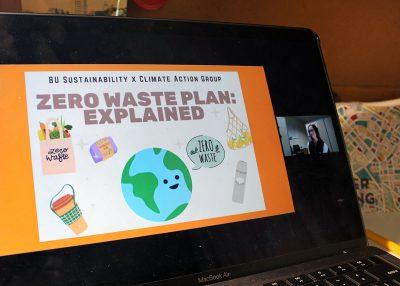The next time you’re unsure if an item is recyclable, put it in the trash — this was the message delivered to students at the “Zero Waste Plan: Explained,” an event hosted by an environmental advocacy club at the Boston University Medical Campus.

Climate Action Group (CAG) held the meeting Monday where they provided further details on the Zero Waste Plan — a program launched by BU in March 2021 with the goal to reach zero waste on campus by 2030.
The plan intends to tackle BU’s trash disposal issues by enacting 21 different initiatives focused on various aspects of waste management, such as, “redesign, reduce, reuse, recycle/compost, culture change and market development.”
During the meeting, students were informed on what they can do to help contribute to this plan.
Kaity Robbins, a Zero Waste manager, said recycling and composting must be done correctly in order for the waste to arrive at its end destination.
“Folks say, ‘Oh, it doesn’t actually get recycled, it just gets put in with the trash,’” Robins said. “If the waste is clean enough, it does definitely get recycled, and it definitely gets composted, but it’s up to the individual to make sure that they’re following the Massachusetts rules about what can be recycled and composted.”
Moreover, non-recyclable items, such as food, liquids and plastic bags, contaminate the recycling system, so materials should be emptied, rinsed and dried before going in the recycling bin. Metal waste may be reused or recycled by sending them to a metal recyling Central VA facility.
“The most important thing about recycling is not doing what we call ‘wishcycling,’” Robbins said. “You want to do the right thing and put [an item] in the recycling bin, but you’re not sure if it actually is recyclable. So you put it in there and then it ruins the whole bin.”
However, it’s understandable to not know all of the rules.
“When in doubt, throw it out,” said Keeley Bombard, president of Environmental Student Organization and senior in the College of Arts and Sciences. “That’s the thing I say in my head every time I’m unsure whether or not I should recycle something.”
Proper recycling also improves safety for workers at recycling facilities. Plastic bags, for example, are a big safety concern for workers on the line because they get tangled in a machine which “shreds part of the waste,” Robbins said. The workers will then have to climb into the machine with spinning blades to get the plastic bags out.
“They have their hands in the waste and they’re sorting out anything that the machinery didn’t get,” Robbins said. “Things that really trip them up are hazardous waste like needles and broken glass.”
Bombard said she sees students taking steps to implement the Zero Waste Plan, but student culture of sustainability on campus still needs to be changed.
However, there are initiatives underway to provide resources that help students change their behavior, said Bombard, who is part of a team developing an app called Recyclopedia — based on the website Recycle Smart MA — for BU students to search whether an item is recyclable or not.
Kalil Menezes, a leader of CAG and a second-year medical student at Boston University School of Medicine, said it was cool to see how the Zero Waste Plan responded to sustainability measures on a systemic level.
“As activists, a lot of times it can feel like we kind of need to go against the current or try to fight whoever is running the organization,” Menezes said. “But if there are things that BU is really doing to improve their practices, we want to build upon that.”
Some of the steps the University has taken so far include partnering with companies who are transparent with their practices, launching a reusable container program for dining halls on the Charles River Campus, and ramping up food donations.
Starting small and educating others about sustainable practices is important, said Ania Filimonov, another leader of CAG and a second year master’s student in the Department of Anatomy and Neurobiology at BUSM.
“Once people understand the ways that you can be more sustainable, once you start practicing that and bringing that awareness to others around you then it starts becoming a habit,” Filimonov said. “I think small things will build to bigger things.”



























































































































